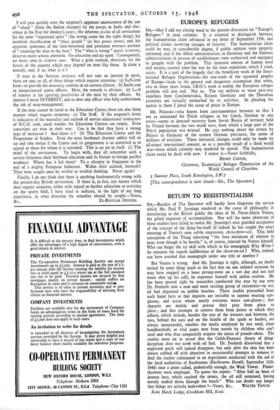Sta,—Readers of The Spectator will hardly have forgotten the service
which Mr. Paul F. Jennings rendered to the cause of philosophy in introducing to the British public the ideas of M. Pierre-Marie Venue, the gifted expositor of resistentialism. Nor will the more observant of those readers have failed to notice Mr. Jennings's own guarded acceptance of the concept of the thing-for-itself (if indeed he has caught the exact meaning of Venue's own subtle expression, chose-pour-soi). This bold conception of the Thing tolerating " the bare minimum of relation to man, even though it be hostile," is, of course, rejected by Ventre himself. Who can forget the icy skill with which in his monograph Why Write? he reasserts the superb indifference of the chose-en-soi ? Who, indeed, can have avoided that monograph under one title or another ?
But Venue is wrong. And Mr. Jennings is right, although, no doubt misled by some thing (such as the fact that on one isolated occasion he may have stepped on a loose paving-stone on a wet day and not had water shot up his calf), he expresses himself with undue caution. He has been proved right by researches conducted this year by our own Dr. Fosforth into a new and most exciting group of resistentia—to wit, oil fuel deposited on pebble beaches. These studies proceeded from such banal facts as that deposits are invisible to anyone wearing sun- glasses, and occur where nearly everyone wears sun-glasses ; that deposits are mobile and pursue their prey from place to place ; and that attempts to remove them from points to which they adhere, which include, besides the seat of the trousers and between the toes, behind the ears and on the handle of the spade or bucket, are always unsuccessful, whether the media employed be wet sand, clean handkerchiefs, or vital pages torn from novels by children who can't read and who thus temporarily acquire the status of pseudo-chose. The studies went on to reveal that the Coleb-Damasci theory of thing- deception does not work with oil fuel. Dr. Fosforth discovered that a neglected patch will indeed disappear, but only after the skin has been almost rubbed off with abrasives in unsuccessful attempts to remove it. And the studies culminated in an experiment conducted with the aid of the local authorities of Eastbourne (Eastbourne Herald, September 11th, 1948) near a point called; pathetically enough, the Wish Tower. Flame- throwers were employed. To quote the report: "After half an hour of intense heat, which cracked the stones, the oil still remained, having merely soaked down through the beach." Who can doubt any longer that things are actively malevolent ?—Yours, &c., WALTER TAPLIN. Kent Hatch Lodge, Crockham Hill, Kent.


































 Previous page
Previous page